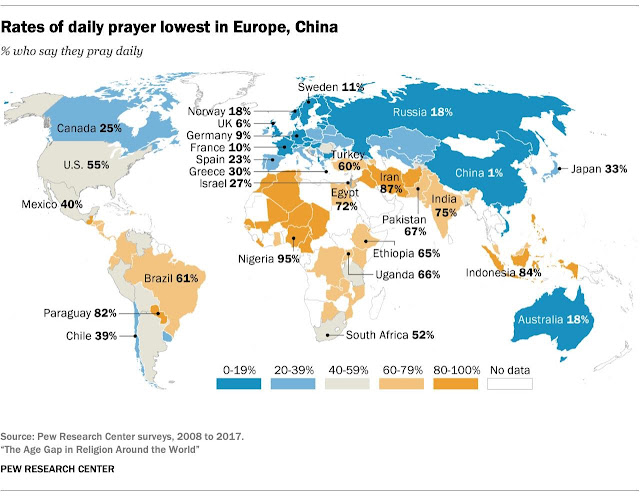PakAlumni Worldwide: The Global Social Network
The Global Social Network
Pew Research: Fewer Pray in Islamic Republic of Pakistan Than in India, Iran
Pew Religious Landscape Study has revealed that 67% of the people in the Islamic Republic of Pakistan pray daily. This figure of 67% in Pakistan is lower than neighboring India's 75%, Iran's 87% and Afghanistan's 97%. Other Muslim majority nations surveyed include Nigeria (95%), Indonesia (84%), Egypt (72%) and Turkey (60%). Oil-rich Arabian Gulf nations were not included in the survey. The Pew study found an inverse relationship between daily prayer levels and incomes. Countries such as the United States and Vietnam are outliers.
The Pew survey shows that the level of daily prayer is the lowest in rich countries and highest in the poor nations. United States is an outlier rich nation with 55% of Americans saying they pray daily. The survey did not include wealthy Muslim nations in the Arabian Peninsula, such as Qatar and the United Arab Emirates, which might be expected to have high levels of prayer.
Level of Daily Prayer Inversely Proportional to Income. Source: Pew... |
Here's what the report says about daily prayer rich nations:
"This May 2 is the National Day of Prayer in the United States, a day Congress set aside in 1952 for Americans to turn “to God in prayer and meditation at churches, in groups and as individuals.” But many Americans pray every day – not just on the Day of Prayer. Indeed, out of 102 countries examined for frequency of prayer by Pew Research Center, the U.S. is unique in that it has both a high level of wealth ($56,000 per-capita gross domestic product in 2015) and a high level of daily prayer among its population (55% according to the 2014 U.S. Religious Landscape Study). In every other wealthy country surveyed – that is, those with a per-capita GDP over $30,000 – fewer than 40% of adults say they pray every day. For example, in Japan, where per-capita GDP is about $38,000, roughly a third (33%) pray daily. In Norway, where per-capita GDP is about $68,000, fewer than one-in-five adults (18%) do. (It’s worth noting that the surveys did not include wealthy countries in the Arabian Peninsula, such as Qatar and the United Arab Emirates, which might be expected to have high levels of prayer.)"
Here's an excerpt of the report on poor nations:
"At the other end of the economic spectrum, countries with less wealth tend to have higher rates of prayer. In fact, every country where at least 70% of adults say that they pray each day has a per-capita GDP under $20,000. For example, in Egypt, where 72% say they pray every day, per-capita GDP is about $11,000. And in Afghanistan, where 96% of adults say they pray every day, the per-capita GDP is about $2,000."
There as exceptions to the norm about higher daily prayer in poor countries, according to the report: "That said, not every country with low wealth has a high level of daily prayer. In Vietnam and Bulgaria – where per-capita GDPs are $6,000 and $19,000, respectively – the shares of adults who say they pray daily are 14% and 15%. (Among all 102 countries examined, the national average share of people who say they pray daily is 49%.)"
Related Links:
The Culture of Corruption in Pakistan
Income, Corruption and Religiosity
Incompetence and Corruption in Pakistan
Deeply Religious People Profoundly Ignorant About Religion?
Income and Wealth in India and Pakistan
Twitter Feed
Live Traffic Feed
Sponsored Links
South Asia Investor Review
Investor Information Blog
Haq's Musings
Riaz Haq's Current Affairs Blog
Please Bookmark This Page!
Blog Posts
Indian Military Begins to Accept Its Losses in "Operation Sindoor" Against Pakistan
The Indian military leadership is finally beginning to slowly accept its losses in its unprovoked attack on Pakistan that it called "Operation Sindoor". It began with the May 31 Bloomberg interview of the Indian Chief of Defense Staff General Anil Chauhan in Singapore where he admitted losing Indian fighter aircraft to Pakistan in an aerial battle on May 7, 2025. General Chauhan further revealed that the Indian Air Force was grounded for two days after this loss. …
ContinuePosted by Riaz Haq on July 5, 2025 at 10:30am
Trump Administration Seeks Pakistan's Help For Promoting “Durable Peace Between Israel and Iran”
US Secretary of State Marco Rubio called Pakistan Prime Minister Shehbaz Sharif to discuss promoting “a durable peace between Israel and Iran,” the State Department said in a statement, according to Reuters. Both leaders "agreed to continue working together to strengthen Pakistan-US relations, particularly to increase trade", said a statement released by the Pakistan government.…
ContinuePosted by Riaz Haq on June 27, 2025 at 8:30pm — 5 Comments
© 2025 Created by Riaz Haq.
Powered by
![]()


You need to be a member of PakAlumni Worldwide: The Global Social Network to add comments!
Join PakAlumni Worldwide: The Global Social Network